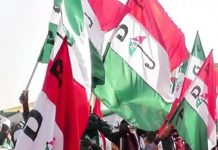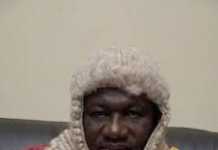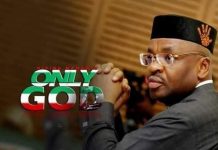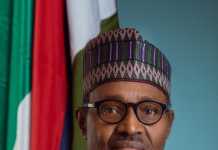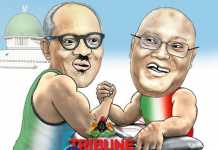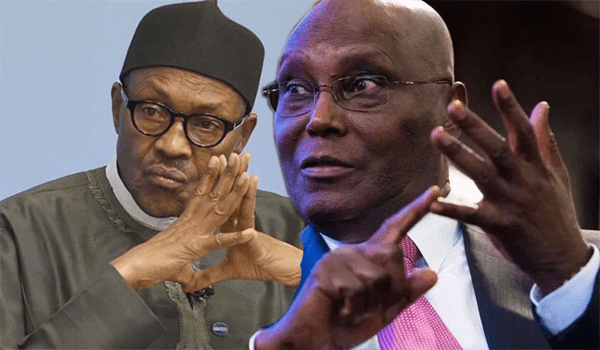
In what many see as arguably the most disputed election in Nigeria’s electoral history in recent times, the controversy surrounding the outcome 2019 Presidential election is about to come to an end. The Presidential election petition tribunal after several weeks of listening to the arguments of President Muhammadu Buhari of the All Progressives Congress, APC and his Peoples Democratic Party, PDP, counterpart, Alhaji Atiku Abubakar, is gradually getting set to deliver its judgement.
The Independent National Electoral Commission, INEC, presided over by Professor Mahmood Yakubu had declared Buhari winner of the February 23 election after polling a total of 15, 191,847 votes, leaving Atiku with 11,262,978 votes to finish second on the log.
But the former Vice President in sync with his party, the PDP, rejected the election outcome, insisting that information in their custody showed that Atiku and not Buhari actually won the mandate of the people for the plum office of the President of the world’s most populous black nation.
A few weeks to the polls, Atiku had at several press conferences intimated Nigerians of the effort put in place to unravel any attempt to compromise the electoral process, both at polling booths and collation centres. Thus, when the umpire announced Buhari the winner, he filed a petition challenging the declaration at the tribunal in line with his earlier pledge to do so. For him, INEC came short of the credibility test in declaring Buhari winner of the keen contest.
For Mr. President and the ruling party however, Atiku has no case, even as they insist that the umpire did a fairly good job despite the shame of having the polls postponed for two weeks, after Nigerians in their numbers had already travelled to their various wards to cast their ballots.
Atiku’s argument
The PDP candidate called a total of 62 witnesses, most of whom stood their grounds to avail the tribunal their findings on February 23. His star witness and former Aviation Minister, Osita Chidoka who also doubled as PDP national collation agent premised his argument on the controversial server, which in his words aided INEC in the transmission of results from the various polling units across the country. According to him, of the about N284 billion spent in the prosecution of the 2019 elections, N27 billion of the sum was voted for electronic transmission and the server, arguing that security agents, allegedly playing the loyalty card in connivance with the umpire, rigged the poll in favour of the ruling party. He presented a visual evidence to back up his position.
The former Vice President also accused the President of lying on oath to boost his qualification by deposing to an alleged false claim in an affidavit presented before the tribunal. Dr. Uzoukwu argued that in the INEC Form CF001, the second respondent (Buhari) named schools that were yet to be established as at the times he made claims to them, adding that certificates from the institutions stated in the forms were not tendered.
Amongst Atiku’s witnesses was David Njoga, a computer wizard who told the tribunal that going by the actual votes cast, the PDP candidate, Atiku Abubakar won the election. Njoga, in his argument, maintained that a whistle blowing website, www.factsdon’tlie.com, allegedly created and managed by INEC technical staff showed that Atiku outscored Buhari with more than 1.8 million votes. He would further take his argument a notch higher by providing the panel with the Internet Protocol (IP) address of the disputed server. INEC has however denied the existence of a server, saying it contravened the provisions of the Electoral Act 2010 (as amended) and the guidelines.
Buhari’s defense
The President in defense of his mandate called about seven witnesses including his trusted allies, Mr. Abba Kyari and Major General Paul Tarfa (retd). In his submission, Kyari, Chief of Staff to the President prayed the tribunal to dismiss Atiku’s petition on the ground that he (Atiku) was not a Nigerian, but a Cameroonian.
The Chief of Staff who fielded questions from Buhari’s counsel, Wole Olanipekun, SAN, claimed that Jada, Atiku’s hometown, was part of Adamawa Province, which in his words was a part of Northern Cameroon when Atiku was born in 1946. He therefore argued that from the get-go, the PDP candidate was not qualified to run for the plum office.
For Olanipekun, the President is satisfied with the evidence presented before the tribunal; an apparent dig at those who argued that more witnesses ought to have been called before the closing the case, saying, “We are very satisfied with the evidence we have led and we will be closing our case as the second respondent,” a position re-echoed by Lateef Fagbemi, SAN, counsel to APC who told the tribunal that presenting witnesses was needless. “We for the third respondent are satisfied with the cross-examination and evidences tendered in this case,” he said.
Dismissing the petitioner’s claims, Olanipekun (SAN), tendered 34 documents as evidence before the tribunal including a Cambridge Assessment Education certified documents, which showed that Buhari passed the examinations with grade II. They also included Cambridge assessment international education certified statements collection receipt number, CTC by WAEC showing the list of candidates that sat in 1961 as well as group photographs of Buhari and others in 1961 among others. PDP rejected these documents describing them as “strange.”
While the tribunal has fixed August 21 for the adoption of final addresses, Atiku’s led counsel reacted to the failure of INEC and the APC from presenting their respective witnesses as a plot against taking further gamble. Arguing that the outcome is one capable of enriching the nation’s electoral jurisprudence, Uzoukwu expressed satisfaction with the energy and resourcefulness put up by his team during the legal tussle.
“I am not surprised because even from the events of the last two days in this court, it was obvious that they couldn’t continue to take the gamble of calling witnesses who rather than improving their cases, were damaging their cases beyond redemption. So, they had to cut their losses. I assure you that this case will, I hope so, define electoral jurisprudence in this country, one way or the other,” he said.
Difficult as it is to hazard a guess as to where the pendulum would swing; the five-man tribunal owes Nigeria a big duty to dispense justice based on the evidence tendered by both parties and candidates without fear or favour. Democracies all over the world had at one time or the other, faced sat issue the test of legitimacy, with the courts coming out time and again with a verdict on behalf of the people.
And regardless of the outcome of this case, Nigerians are unanimous in their call for an assent to the Electoral Act Amendment Bill. With the next general election cycle due in 2023, perhaps, now is the time to do so, thereby eliminating paper work, which many have seen as the bane of transparent election since the attainment of independence in 1960.
Kindly contact us @ Naijalivetv@gmail.com
Call or Whatsapp: 07035262029, 07016666694, 08129340000



